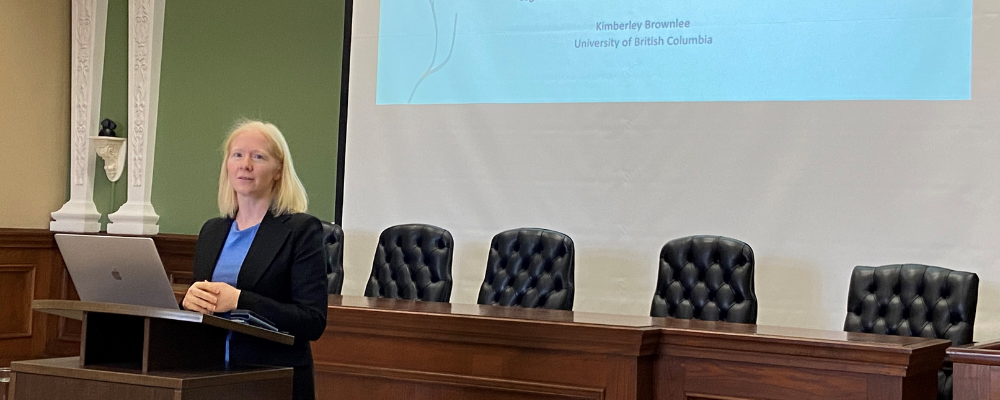Is civil disobedience defensible when it comes to climate activism? UBC's Professor Kimberley Brownlee explores
December 20, 2023

In November, Western Law's Legal Philosophy Research Group welcomed Professor Kimberley Brownlee, the Canada Research Chair in Ethics and Political & Social Philosophy at the University of British Columbia, for their annual public lecture. Brownlee explored the topic of “Civil Disobedience and the Climate Necessity Defence (in Canada)”, providing detailed insight on topics ranging from the philosophical origins of civil disobedience to contemporary jurisprudential views on the topic to conditions for morally justified causes.
Laying the framework for her argument that civil disobedience to mitigate the effects of climate crisis has a good claim to vindication, Brownlee began by outlining the tradition, concept, and function of civil disobedience. She explained that the term was originally coined by Henry David Thoreau (or perhaps by his sister, Sophia Thoreau) and further developed by contemporary scholars such as John Rawls and Western’s own Keith Fleming. Brownlee ultimately defined civil disobedience as a “conscientious communicative break of a legal norm, undertaken with the aim of bringing about a change in law or policy, through a deliberative process rather than through coercion or terrorization.”
Brownlee explained that the function of civil disobedience is to expose gross injustice, rectify moral deficits, catalyze large-scale movements, and act as a stabilizing force in society. She cited multiple examples of individuals and groups who have engaged in civil disobedience, ranging from civil rights heroes Rosa Parks and Martin Luther King Jr to the climate activist organization Extinction Rebellion.
Brownlee then considered the contrasting views of Canadian courts on the topic. She explained that judges frequently differ in their views about the relevance of civil disobedience to illegal conduct. Some judges dismiss civilly disobedient conduct as simply another form of ordinary offending while others view civilly disobedient conduct as an aggravating factor, making the illegal conduct more serious. Finally, some judges view civilly disobedient conduct as praiseworthy when undertaken in defence of a just cause.
Building on this last idea, Brownlee then turned her attention to the connection between civil disobedience and the common law defence of necessity. She explained that certain forms of civil disobedience may be morally justified if seen as supporting a just cause, as a last resort, or on grounds of parsimony. However, consistent with the Supreme Court of Canada’s jurisprudence in cases like R v Perka and R v Latimer, Brownlee emphasized that the actions must be undertaken in response to imminent peril or danger, there must be no reasonable legal alternative, and there must be proportionality between the harm inflicted and the harm avoided.
Brownlee concluded that civil disobedience is justified for climate activism because “we can’t wait for a better season,” in the powerful words of Martin Luther King Jr. In his speech from the Birmingham City Jail, King implored political leaders to end their paternalistic view that they can “set the timetable for another man’s freedom” and to stop telling Black Americans to “wait for a more convenient season.”
With sensitivity to the differences between the American civil rights movement and today’s global climate crisis, Brownlee drew parallels between the need for civil disobedience during these historical turning points. She ended her lecture by concluding that the urgency of the climate crisis makes civil disobedience a necessary tool to compel those in power to take swift and significant action in the fight against climate change.





